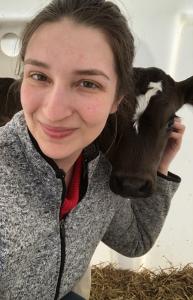 |
Jessica St JohnPosition/Title: PhD Student email: stjohnj@uoguelph.ca Phone: Office:
|
About me
I grew up on a hobby farm in British Columbia, caring for pigs, chickens, and horses. This started my love for animal husbandry and welfare. During my BSc at the University of Guelph, I worked as a research assistant at the University of Guelph Alfred Campus, an organic dairy research barn, for Dr. Renée Bergeron and Dr. Elsa Vasseur. This experience introduced me to the wonderful dairy cow behaviour and welfare research world. Thus, after attaining my BSc in Biological Sciences, I completed a thesis-based MSc at McGill University in Animal Science, with a focus on dairy cow welfare and behaviour as a part of Dr. Elsa Vasseur’s lab (CowLife McGill University). During my MSc, I published my research on tie-rail placement in tie-stall barns in the Journal of Dairy Science (full article here). I also co-authored a paper on scoring abnormal lying and rising behaviour in dairy cows that was published in Applied Animal Behaviour Science (full article here). After which, I continued working in the animal behaviour research field and am currently working part-time as an Animal Comfort & Welfare Research Professional at Lactanet.
PhD Research
Currently, I am completing my PhD under the supervision of Dr. Renée Bergeron. My research topic explores the effect grazing behaviour and pasture management has on dairy cow health and production. This research is of value as pasture access may improve dairy cow welfare, as it has been found that cows can be highly motivated to access pasture. Additionally, grazing cows at pasture can be an economical feed source. However, pasture access can also be linked to an insufficient intake of nutrients, especially for high-yielding cows. Therefore, to better understand dairy cow grazing behaviour and improve grazing efficiency, my research will 1) test different pasture management systems and seed mixtures to determine best practices for production and health, and 2) observe feed preferences and grazing behaviour in pastured dairy cows to determine their relation to health and productivity. The first pasture management system we are testing is pre-mowed pasture, which refers to a pasture cut prior to grazing. It is hypothesised pre-mowed pasture will reduce selective grazing and time spent eating, resulting in improved milk production. Two other pasture management systems will be selected for testing, which are either linked to improved milk production or most common based on surveyed organic dairy farms. Similarly, 10 forage species and 8 forage mixes will be selected based on the survey, and a preference test will be performed to determine which forages dairy cows prefer to graze. Finally, we will observe dairy cows on pasture and record the variations in grazing behaviour. We predict healthy and high-producing cows will display “better” grazing behaviour, including efficient and/or selective grazing.
After completing my PhD, I aim to continue conducting research on different dairy production practices to assist in determining the best management practices which may improve both dairy cow welfare and production.

